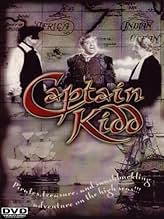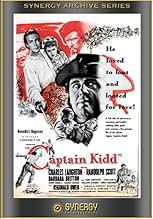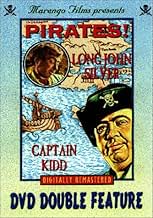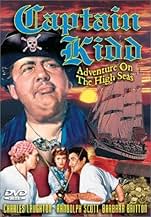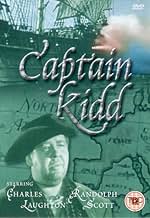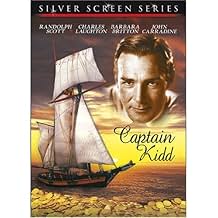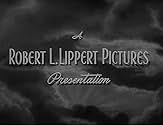NOTE IMDb
6,3/10
2,3 k
MA NOTE
Ajouter une intrigue dans votre langueThe unhistorical adventures of pirate Captain Kidd revolve around treasure and treachery.The unhistorical adventures of pirate Captain Kidd revolve around treasure and treachery.The unhistorical adventures of pirate Captain Kidd revolve around treasure and treachery.
- Réalisation
- Scénario
- Casting principal
- Nommé pour 1 Oscar
- 1 nomination au total
George Barrows
- Pirate
- (non crédité)
Arthur Berkeley
- Pirate
- (non crédité)
Abner Biberman
- Theodore Blades
- (non crédité)
Edward Biby
- Nobleman
- (non crédité)
Willie Bloom
- Guard
- (non crédité)
Harry Cording
- Newgate Prison Warder
- (non crédité)
Jimmy Dime
- Pirate
- (non crédité)
Avis à la une
This film is a fictional story of a real man in history: Captain William Kidd. The real Captain Kidd lived from c. 22 January 1645 – 23 May 1701 (death by hanging for piracy) but that is another story.
Captain Kidd (1945) is a worthy sea adventure - a pretty good drama. Great casting lead by Charles Laughton as William Kidd, supported by John Carradine as Orange Povey, Randolph Scott as Adam Mercy & Barbara Britton as Lady Anne Dunstan.
The film is what you would expect from a film of this nature: gold, swashbuckling fight scenes, sunken ships, back-stabbing, treachery, stormy seas, stealing -- just an all around fun adventure film.
8/10
Captain Kidd (1945) is a worthy sea adventure - a pretty good drama. Great casting lead by Charles Laughton as William Kidd, supported by John Carradine as Orange Povey, Randolph Scott as Adam Mercy & Barbara Britton as Lady Anne Dunstan.
The film is what you would expect from a film of this nature: gold, swashbuckling fight scenes, sunken ships, back-stabbing, treachery, stormy seas, stealing -- just an all around fun adventure film.
8/10
A classic example of a pirate melodrama, this production purports to be based on the life of the historic Captain Kidd (played with campy, eye-waggling mannerisms by Laughton). There are few pirate cliches that don't find their way into Norman Reilly Raine's overwrought script - buried treasures, kidnapped maidens, English nobles masquerading as buccaneers. Much of it is unintentionally silly: It is, for example, impossible to take the hale, beefy, Virginia-twanged Randolph Scott as either an English nobleman or a pirate. Scott claims two friends aboard Kidd's pirate ship, both strangely effete, deferential characters: Another pirate, who acts as Scott's valet, and Kidd's own valet, who spends most of the movie surreptitiously assisting Scott in his scheming against the pirate captain. Kidd's companions, by comparison, are swaggering caricatures, and Kidd spends most of the movie scheming to dispatch them in one of the film's strangest images: Laughton, huddled over a small book, jotting down names or crossing them out, muttering to himself and cackling.
Much of this is good fun, and some of the cinematography is gorgeous - even by today's standards, the use of miniatures and trick camerawork creates a convincing illusion of ships at battle on roiling seas. But the story is so far from history that there seems to be no good reason to name Laughton after the real Captain Kidd, a bumbler whose short career as a pirate and humiliating death was little but a series of bizarre travesties. But the script is awkward and choppy, and many of the set pieces are strangely cramped and stagey, as though this were a theatrical production rather than a film. Ultimately, the true pleasure in watching the film comes from Laughton's peculiar performance, which is similarly theatrical, as though it were an oversized clown act from a London stage transferred to film. He plays Kidd without nuance, telegraphng the captain's bloated greed and amorality as though these were comical personal eccentricities. The closest the screen has since produced to Laughton's outre characterization is Harvey Fierstein's Pirate King character in 1997's Kull the Conqueror, which is pure camp.
Laughton was, in fact, gay, and though this fact is never made overt in Captain Kidd, there is some surprising subtext. Two scenes in particular strike contemporary eyes as having implicitly camp sensibilities - one in which Laughton sniffingly dismisses any interest in female companionship, and another scene in which Scott, a legitimate beefcake, shares a bath with his valet, both happily scrubbing each other while surrounded by hundreds of semi-clad pirates. Yo ho ho.
Much of this is good fun, and some of the cinematography is gorgeous - even by today's standards, the use of miniatures and trick camerawork creates a convincing illusion of ships at battle on roiling seas. But the story is so far from history that there seems to be no good reason to name Laughton after the real Captain Kidd, a bumbler whose short career as a pirate and humiliating death was little but a series of bizarre travesties. But the script is awkward and choppy, and many of the set pieces are strangely cramped and stagey, as though this were a theatrical production rather than a film. Ultimately, the true pleasure in watching the film comes from Laughton's peculiar performance, which is similarly theatrical, as though it were an oversized clown act from a London stage transferred to film. He plays Kidd without nuance, telegraphng the captain's bloated greed and amorality as though these were comical personal eccentricities. The closest the screen has since produced to Laughton's outre characterization is Harvey Fierstein's Pirate King character in 1997's Kull the Conqueror, which is pure camp.
Laughton was, in fact, gay, and though this fact is never made overt in Captain Kidd, there is some surprising subtext. Two scenes in particular strike contemporary eyes as having implicitly camp sensibilities - one in which Laughton sniffingly dismisses any interest in female companionship, and another scene in which Scott, a legitimate beefcake, shares a bath with his valet, both happily scrubbing each other while surrounded by hundreds of semi-clad pirates. Yo ho ho.
This low-budget swashbuckler starts on Magadascar where Captain Kidd (Charles Laughton)attacks the vessel called ¨twelve apostles¨. London, 1699, Captain Kidd receives a card from the King William III(Henry Daniell): ¨Upon the solicitation of my Lord Bellomont, his Majesty is graciously pleased to order to attend up him at Hampton court , upon the morning of November 13, at nine of the clock , captain William Kidd, ship master, of New York, with intent to discuss a voyage of portent to the waters of India and Magadascar¨.Then Kidd is assigned by King William III to escort on the high seas a ship plenty of treasures from Calcuta until England. As he enlists a misfit crew(Scott, Roland,Qualen, among others) formed by thieves and killers, including to Orange Poverty(John Carradine) who had previously abandoned on an island of Magadascar.
Charles Laughton made an excellent acting as Kidd, a roguish, sly, ironic and traitor pirate, lookalike his character of ¨Jamaica Inn¨ by Hitchcock. Later he retook this role in farce style with ¨Abbot and Costello meet captain Kidd¨ by Charles Barton. However the starring Randolph Scott is miscast because is usually in Western and here he's out. Good secondary cast formed by prestigious secondaries as John Carradine,Henry Daniell,John Carradine, John Qualen, Reginald Owen and Gilbert Roland. the motion picture is professionally directed by Rowland V Lee.
The story is partially based on real events , the actual deeds happened of the following manner : Kidd was born 1865, Scotland. The military staff hires him to command the ship called ¨Blessed William¨ during the war of nine years(1688-1697) between England and France. Then Kidd sacks the vessel Marie Galante and numerous French warships.After gets license from British admiralty for exercise as buccaneer, commanding the ¨Adventure Galley¨ with 34 cannons and 80 men. He decides to plunder the ¨Quedagh Merchant¨a galley full of treasures and another ships of various countries. Then the captain found himself held capture and transported to England where he was condemned to death penalty in 1701. He was hung but the rope broke itself two times. His corpse was charged in chains throughout of river Thames as warning and punishment.
Another films about this historical character are : ¨Double crossbones¨(1950) by Charles Barton with Alan Napier as Kidd; ¨Against all flaggs¨(1952) with Robert Warwick as Kidd; ¨Great adventures of Captain Kidd¨ with John Crawford; and ¨Kidd and the slave girl¨(1954) by Lew Landers and Anthony Dexter as the famous pirate.
Charles Laughton made an excellent acting as Kidd, a roguish, sly, ironic and traitor pirate, lookalike his character of ¨Jamaica Inn¨ by Hitchcock. Later he retook this role in farce style with ¨Abbot and Costello meet captain Kidd¨ by Charles Barton. However the starring Randolph Scott is miscast because is usually in Western and here he's out. Good secondary cast formed by prestigious secondaries as John Carradine,Henry Daniell,John Carradine, John Qualen, Reginald Owen and Gilbert Roland. the motion picture is professionally directed by Rowland V Lee.
The story is partially based on real events , the actual deeds happened of the following manner : Kidd was born 1865, Scotland. The military staff hires him to command the ship called ¨Blessed William¨ during the war of nine years(1688-1697) between England and France. Then Kidd sacks the vessel Marie Galante and numerous French warships.After gets license from British admiralty for exercise as buccaneer, commanding the ¨Adventure Galley¨ with 34 cannons and 80 men. He decides to plunder the ¨Quedagh Merchant¨a galley full of treasures and another ships of various countries. Then the captain found himself held capture and transported to England where he was condemned to death penalty in 1701. He was hung but the rope broke itself two times. His corpse was charged in chains throughout of river Thames as warning and punishment.
Another films about this historical character are : ¨Double crossbones¨(1950) by Charles Barton with Alan Napier as Kidd; ¨Against all flaggs¨(1952) with Robert Warwick as Kidd; ¨Great adventures of Captain Kidd¨ with John Crawford; and ¨Kidd and the slave girl¨(1954) by Lew Landers and Anthony Dexter as the famous pirate.
I had limited expectations coming into my viewing of Captain Kidd, but found myself pleasantly surprised. Unfortunately, the actual quality of the film I saw was rather poor, resulting in a dark and poor quality screening. Otherwise I found the film to be basically fun. Oh, there's not really much action going on, which is disappointing considering it is a pirate film taking place on the high seas, but the playfulness of the script and exuberance of Laughton's performance makes up for several of the shortcomings of Captain Kidd to make it a solid pirate/seafaring film worth checking out if you're interested.
There's plenty of good action and intrigue in this fictionalized account of the infamous "Captain Kidd". Charles Laughton is in his element as the treacherous, clever pirate captain, and he is given good support from the rest of the cast and from the overall production.
The story starts with Kidd having just successfully completed one of his attacks, and using it as a springboard for a more ambitious and daring plan to make himself an English lord. Despite the rather far-fetched nature both of his scheme and of much of the plot as a whole, Laughton's rousing performance and the movie's other strengths carry everything off nicely.
The story setup is nicely conceived, pitting Kidd and his deceitful scheming against some fully worthy adversaries with plots and secrets of their own, with John Carradine enjoyably spiteful as Kidd's long-time untrustworthy partner, and Randolph Scott as a mysterious convict who gets recruited to be Kidd's master gunner. The three of them join in an entertaining battle of nerves and wits, with most of the other characters serving as useful pawns in their game. Reginald Owen also pitches in as something of a wild card character whose loyalties are, for a time, uncertain.
The action sequences are good, and they are also interspersed at well-chosen intervals in the main plot. It has plenty of interesting detail that sets off the action nicely. This is the kind of action-packed movie that, as long as you don't pause to analyze it too closely, provides very good entertainment with a lot of interesting story developments.
The story starts with Kidd having just successfully completed one of his attacks, and using it as a springboard for a more ambitious and daring plan to make himself an English lord. Despite the rather far-fetched nature both of his scheme and of much of the plot as a whole, Laughton's rousing performance and the movie's other strengths carry everything off nicely.
The story setup is nicely conceived, pitting Kidd and his deceitful scheming against some fully worthy adversaries with plots and secrets of their own, with John Carradine enjoyably spiteful as Kidd's long-time untrustworthy partner, and Randolph Scott as a mysterious convict who gets recruited to be Kidd's master gunner. The three of them join in an entertaining battle of nerves and wits, with most of the other characters serving as useful pawns in their game. Reginald Owen also pitches in as something of a wild card character whose loyalties are, for a time, uncertain.
The action sequences are good, and they are also interspersed at well-chosen intervals in the main plot. It has plenty of interesting detail that sets off the action nicely. This is the kind of action-packed movie that, as long as you don't pause to analyze it too closely, provides very good entertainment with a lot of interesting story developments.
Le saviez-vous
- AnecdotesCharles Laughton reprised his role as Captain Kidd in Les joyeux pirates (1952).
- GaffesSailors (who were unlikely to wear shoes on ships anyway) would never wear shoes into a powder magazine. The chances of a spark from boot/ shoe nails amid all that powder was too great.
- Citations
Orange Povey: You cold-gutted shark.
Capt. William Kidd: Ahh!... You're a flatterer. You've no idea how gratifying it is to have a congenial soul to confide in.
- Versions alternativesThe Roan Group DVD version, which comes from an excellent print, is sadly missing one of the best scenes in the film. In the scene Charles Laughton has trouble dressing for dinner on the ship, he is chastised for his hair-do by his valet, and then gets confused with his manners during dinner. We also learn a little more about Randolph Scott's character in this delightful scene. It can be found on the Australian VHS release from Force Video.
- ConnexionsFeatured in Sprockets: Masters of Menace (1995)
- Bandes originalesRule Britannia
(uncredited)
Lyrics by James Thomson
Music by Thomas Augustine Arne
Heard when toasting the merchant ship and when the ships meet on the sea
Meilleurs choix
Connectez-vous pour évaluer et suivre la liste de favoris afin de recevoir des recommandations personnalisées
- How long is Captain Kidd?Alimenté par Alexa
Détails
- Date de sortie
- Pays d’origine
- Langue
- Aussi connu sous le nom de
- Captain Kidd
- Lieux de tournage
- General Service Studios - 1040 N. Las Palmas, Hollywood, Los Angeles, Californie, États-Unis(miniature 1695 London dock)
- Société de production
- Voir plus de crédits d'entreprise sur IMDbPro
Box-office
- Budget
- 1 500 000 $US (estimé)
- Durée
- 1h 30min(90 min)
- Couleur
- Rapport de forme
- 1.37 : 1
Contribuer à cette page
Suggérer une modification ou ajouter du contenu manquant

